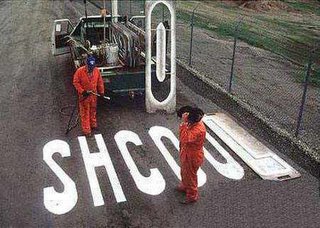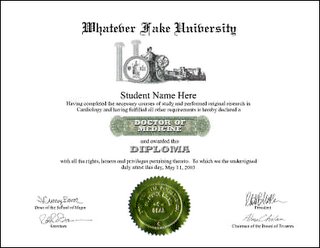Education as commodity

"College education" is one of those concepts slathered in meanings, expectations, and symbolism. Today the breadth of degree choices are astounding; AAS, BS, BA, MA, MFA, MD, MSc, MA, MB, MBChB, PhD, DPhil…letters add prestige, assumptions, salary increases, career advancement, maybe a shot at an academic job.
Although awarding of degrees for higher education is an ancient practice dating back to the Greeks, the modern series of academic degrees as they are known today formed in the nineteenth century, a product of increasing specialization, standardized education, industrialization, scientific advancement, and economic expansion.
Wikipedia lists entries for higher education, undergraduate, graduate, PhD, and doctorate degrees. They also list an informative entry for higher education which includes this:
In most developed countries a high proportion of the population (up to 50%) now enter higher education at some time in their lives. Higher education is therefore very important to national economies , both as a significant industry in its own right, and as a source of trained and educated personnel for the rest of the economy; it is often argued that in a modern economy the quantity and quality of such human capital is the most important factor underlying economic growth.
What was once a 'dedication to learning' has become a commodified cog of economic growth, at least in the United States. So its no wonder that with such high economic stakes, especially for individuals, a certain level of cheating has accelerated in the past decade.

David Edmondson, CEO of Radio Shack, could be called a poster-executive for this growing trend.
Claire Babrowski, RadioShack's recently installed acting CEO, may have found that her impressive curriculum vitae came in for closer scrutiny than usual when acceding to her new post. She's got David Edmondson, the former incumbent, to thank for that.
The revelation of Edmondson's resume as a cock-and-bull story--including claims of earning two college degrees for which the school he attended has no records--has led to his resignation, though Edmondson's brief statement Monday sidestepped the issue: "At this time the board and I have agreed that it is in the best interest of the company for new leadership to step forward so that our turnaround plan has the best possible chance to succeed, as I know it will," he said.
While Edmondson isn't the first to pull such a stunt, he certainly won't be the last. That senior officials and executives, public and private, risk their careers on faked diplomas is telling. The perception of holding an advanced degree can hypnotize normal skeptics into not checking records. The symbolic meaning of letters appearing after a name, or not, can also overshadow expectations and intellectual muscle. While it seems that Edmondson only acquired two semesters of undergrad ed, his co-executives seemed entranced and happy enough for several years with the CEO's performance. Sans a degree, Edmondson's illusion of attaining a college education seemed to work just fine as he functioned within Radio Shack's corporate structure.

Like the media, books, music, and movies, brick-and-mortar institutions of higher learning are facing disintermediation via online universities. Why stop your life to move to a university town and drudge away for 4-8 yrs for that piece of paper when you can log in after dinner and email your presentation before Niteline? Lectures on iTunes, "smart rooms" equipped with remote cameras for distance students…why collect tuition from 30 students when you can set up some cameras and collect on 300? Revenue beckons.
At the same time the perception of education has changed. As Edmondson and other recent cheats demonstrate, saying you have such-and-such degrees, including even diploma-milled PhDs, is all that's needed for advancement. No checks required. More alarming is that a degree-faker wouldn't be recognized for their lack of intellectual rigor as they perform their jobs, public or private. That the letters and fake diploma are enough to dupe many says much about the state of higher education, as well as the dream-state level of symbolic value these commodities are publicly perceived as.
But then, what if you're honest--snake your way through the system, spend years in the academic castle and achieve your PhD, DPhil? Does employment within the system await?…60 yrs ago the answer would be yes! Today its "NO". For every 3,000 PhD graduates there are only 800 academic jobs. What about leaving academia with an academic degree to pursue careers in private industry? This would be a great idea if not for academia's and the public's perception of the letters "PhD". Academics will dismiss you like chattle for "not cutting it" and private employers will equate the letters p-h-d with "too expensive" and "not relevant".
I personally know four PhD's who are considerably underemployed or unemployed. History major, anthropologist, special ed, and biologist…working as copywriters, insurance salespersons, etc. I'd considered a PhD myself, but after working with PhDs, and knowing others who cannot find employment in their fields, I considered the ROI not worth it [My measurement of ROI included income, but the clincher was quality of life. After all that work and expense, only 800 jobs per 3,000 students? Could I live with my doctoral-self working at Wal-Mart?] and instead happily pursued an MA with studies in applied areas for good measure.
So "get thee to a phd program" —as one commenter suggested— is quite a narrow, arrogant/slobsnoby point of view. PhD programs are terrific, if your life is set up for them, if you can live on learning alone, thirst for the public perception attached to it, or have an uncle whose a dean at your local U. Like any other subgroup, it has its limits, conformities, beliefs, prejudices, and baggage. It is not an intellectual halo. Any degree, any education, is really about what you do, or don't do, with it.
There are many accomplished professionals whose intelligence and innovative-thinking eclipse their meager college degrees. There are others who's natural talents are so profound they don't bother with college. Perception works in many ways. A person's perception of their own value is just as important, perhaps more important, than the value a culture assigns to them. Belief in self makes all the difference, and in an increasingly commodified higher education system it can be the factor that makes or breaks you as you wind your way through the hallowed, but somewhat dank, hallways of an academic education out into the sunlight of the real world.

0 Comments:
Post a Comment
<< Home